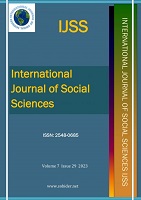Raya Dunayevskaya: Hegel ve Marx Arasındaki Diyalektik Sınırlar
Raya Dunayevskaya: Dialectical Boundaries Between Hegel And Marx
Author(s): Dilan ERGÜN TEKİNGÜNDÜZSubject(s): Marxist economics, Social Philosophy, German Idealism, Evaluation research, Human Resources in Economy, Socio-Economic Research
Published by: SD Yayınevi
Keywords: Raya Dunayevskaya; Karl Marx; Hegelian Dialectics; Alienated Labor; Marxist- Humanism.;
Summary/Abstract: This article aims to discuss the dialectical relationship between Hegel and Marx, based on the Marxisthumanist thought of which Raya Dunayevskaya is the founder, through the concept of "alienated labor", which is one of the fundamental phenomena of Marxism. For Dunayevskaya, Marx's emphasis on humanism in Economic and Philosophical Manuscripts of 1844, is directly linked to his discovery of the revolutionary aspect of the dialectics of negativity, which was at the heart of Hegel's absolute idealism. Thus, from the moment when workers' movements discover the dialectic of absolute negativity, they are transformed into freedom struggles capable of human self-determination. Thus, the dialectical law formulated by Hegel as the ‘negation of the negation’ is read by Marx as the first negative, the sublate of alienated labor. For Dunayevskaya, Marx is the only one who, unlike traditional Marxism, can save the Hegelian dialectic from its mystic aura by transforming it into a philosophy of liberation. For Dunayevskaya, the dialectical boundaries between Marx and Hegel are determined by the absolute negativity/ dialectic of negativity that Marx thinks he depts to Hegel.
Journal: Uluslararası Sosyal Bilimler Dergisi
- Issue Year: 7/2023
- Issue No: 29
- Page Range: 1-15
- Page Count: 15
- Language: Turkish

